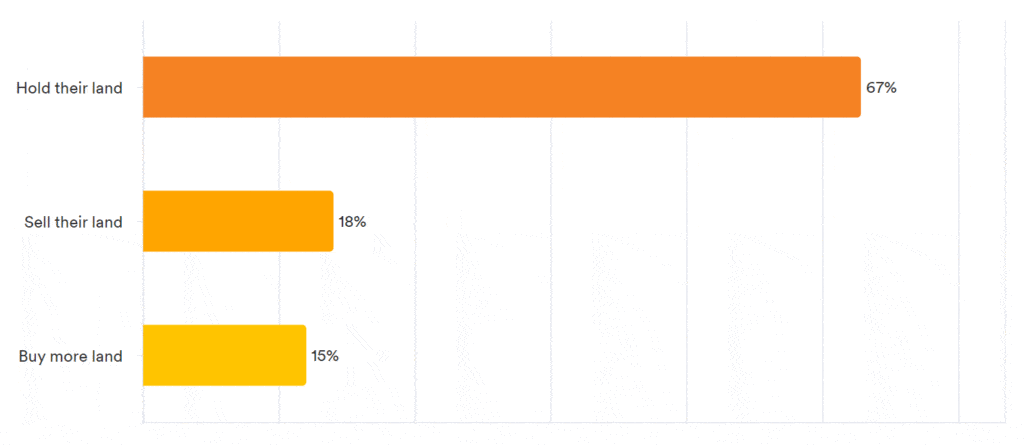The December LANDTHINK Pulse revealed 67% of respondents believe that if high inflation and interest rates persist throughout the year landowners will hold their land and wait to see what happens. The last three years have been a whirlwind with the real estate market going from very aggressive to rapidly cooling in what seems like the blink of an eye. Many Americans worry that a major recession is right around the corner. The Federal Reserve has raised interest rates several times within the last year to combat wild inflation, which has left buyers with pricier mortgage payments and less purchasing power. Clearly the real estate market is descending into correction territory.
Last month, the December Pulse asked: If high inflation and interest rates persist throughout 2023, how will landowners react?

Understandably, land buyers and sellers are pretty weary going into 2023. Will inflation continue to abate? Will there be a recession or will the Federal Reserve deliver a so-called “soft landing”? If you are a landowner contemplating selling, you might be asking yourself whether or not it’s the right time. Honestly, it depends. It depends on whether or not we’re actually in a recession, other economic factors, your immediate needs, and your overall financial picture.
Regardless of the economy, selling land is a big undertaking and requires a certain level of preparation and thoughtful planning. Concerns over an economic recession have infiltrated just about every aspect of our lives. However, may landowners can and sometimes should proceed with the sale of their property with confidence that the outcome will be favorable. It is absolutely possible to succeed in selling your land during a recession. It requires a unique approach and careful consideration. Here are a few thoughts for landowners to reflect on.
Is the Timing Right?
You may be worried about the timing when it comes to financial outcome, but have you considered if the timing of your property sale aligns with the needs of yourself and your family? People sell rural land for any number of different reasons. Life circumstances sometimes make it necessary to sell your land even in an unfavorable market. If you have encountered sudden unforeseen expenses, like major medical bills or expensive home repairs or you might lose your job or experience a significant decrease in income, then selling your land will remove the debt burden of needing to make the payment and might help you to avoid financial difficulties from the cost of ownership. If you are opting for a life change that involves moving to another state, more room for a growing family or a bigger footprint is needed for permanent work-from-home space, then selling might be the right move. Some of these scenarios will apply to many landowners, which is why land is always changing hands.
Can You Sit Tight and Wait for the Right Buyer?
There’s a lot of discussion about higher mortgage rates and inflation driving more buyers out of the market, slashing demand and forcing inflated land prices to come down. We don’t know exactly how things will shake out in the land market throughout the course of 2023. Right now, rural land sellers still have the upper hand, especially in the Southeast. That’s because inventory is still sorely lacking, so sellers can get away with charging higher prices in the absence of buyers having options. Cash purchases have also increased in the last three years. If your timeline to sell is flexible, that alone is a good reason to sell your land in 2023- you can wait for the right buyer to come along and offer the right price. The uneven economic impact of the pandemic allowed some buyers to save more money, investors to see substantial stock market gains and homeowners to receive top dollar for their properties. All of these factors contributed to an increase in cash buyers, which may continue through the rest of the year.
Unload a Depreciating or Underperforming Asset
This level of economic uncertainty should lead landowners and investors to review their portfolios and take an objective look at the performance of their holdings. If there are properties that are not bringing you the ROI that you desire, there may be an opportunity to sell off some of the lagging or overpriced investments for higher-yielding properties. Selling today could help you from selling at a lower price in the future.
Trade-Up for a Better Opportunity
Selling land in a recession can give you the opportunity to buy another tract with more upside potential in the future. The biggest advantage in this is the ability to customize the land and turn it into the dream property you’ve always envisioned owning. Obviously, everyone has different priorities, but the beauty of buying land is having free rein to choose certain elements you want in your dream property- everything from hunting enhancements and improved vegetation to the addition of a water feature. This can usually be achieved at a much lower price than a turnkey. Maybe you’re looking for new ways to generate income from owning land. From harnessing wind energy to growing specialty crops, a recession is actually an excellent time to sell a current holding and upgrade to a larger asset with more earning potential.
Take Advantage of Pent-Up Demand
We’re still in a seller’s market. The low inventory of rural land for sale increases the competition for your property when you’re selling during a recession. There has been low land inventory for quite a while. People that were ready and qualified to buy may not have been able to find something that fit their needs. This could be a great opportunity for you if you own a desirable property that would attract many potential buyers.
Price Drops Will Likely Be Small
When you choose to sell property during a recession, there is a chance that you will see some decline in price. This is due to the fact that prices peak right before a recession when it is a seller’s market and there are fewer properties available. The Great Recession was a significant housing recession that resulted in the bubble bursting and prices dropping to record lows. However, this is not typical for most recessions. This means that declines in land and housing prices will be small if there even is a decline in price. If you sell your land during a recession, you will still be able to get a good price. The overall impact of a recession on the land market will depend on the area.
A recession is a period of time of lower economic activity and reduced or negative economic growth. A recession will affect land values and the land market. To many Americans, it may feel like we’re already in a recession, but the nation isn’t officially in a recession until the National Bureau of Economic Research declares one, and that has not happened yet. Selling your property during a recession has benefits, but it has consequences, too. Landowners should carefully consider their options and needs when deciding to sell their property.
Our informal online survey revealed that 67% of the LANDTHINK audience believe that if high inflation and interest rates persist throughout the year landowners will HOLD THEIR LAND. Only 18% said that landowners would SELL THEIR LAND and 15% said landowners would BUY MORE LAND.
Do you have a suggestion for next month’s Pulse question? Submit your question and we might choose yours!
This content may not be used or reproduced in any manner whatsoever, in part or in whole, without written permission of LANDTHINK. Use of this content without permission is a violation of federal copyright law. The articles, posts, comments, opinions and information provided by LANDTHINK are for informational and research purposes only and DOES NOT substitute or coincide with the advice of an attorney, accountant, real estate broker or any other licensed real estate professional. LANDTHINK strongly advises visitors and readers to seek their own professional guidance and advice related to buying, investing in or selling real estate.










Add Comment